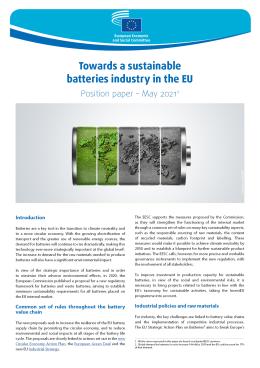European Economic
and Social Committee
Obehové hospodárstvo
Prechod na obehové hospodárstvo patrí medzi priority EHSV ako jedno z riešení v boji proti klimatickej kríze a na ochranu našej planéty. Je to skvelá príležitosť pre občiansku spoločnosť, keďže to môže pomôcť:
- zvýšiť konkurencieschopnosť európskeho priemyslu,
- podporiť udržateľný hospodársky rast,
- vytvoriť nové pracovné miesta.
Model výroby a spotreby podľa zásady „vziať - vyrobiť - odhodiť“, ktorý v našom hospodárstve ešte stále prevláda, vedie nielen k plytvaniu zdrojmi, ale taktiež sťažuje boj proti zmene klímy. Na rozdiel od tohto lineárneho hospodárstva vychádza obehové hospodárstvo z koncepcie regenerácie a obnoviteľnosti a zameriava sa na tvorbu a zachovanie hospodárskej hodnoty, pričom pomáha riešiť globálne environmentálne výzvy, ako sú zmena klímy, strata biodiverzity a znečistenie, a zároveň prináša hospodárske výhody.
Dobrou správou je, že transformácia na obehové hospodárstvo sa už v praxi stáva realitou. Zainteresované subjekty z radov občianskej spoločnosti vrátane podnikov, odborových zväzov, akademickej obce a znalostných komunít, mládežníckych organizácií, ako aj MVO a iných záujmových skupín vytvárajú a realizujú množstvo obehových iniciatív na miestnej a regionálnej úrovni. Podpora obehových riešení a vedúcej sily príslušných zainteresovaných subjektov je pre Európu najlepším spôsobom, ako urýchliť prechod na obehové hospodárstvo.
Má k tomu prispieť aj Európska platforma pre obehové hospodárstvo, ktorá bola ako spoločná iniciatíva EHSV a Európskej komisie zriadená v roku 2017 s cieľom spojiť komunitu obehového hospodárstva v Európe. Platforma zameraná na zainteresované subjekty podporuje prechod Európy na obehové hospodárstvo prostredníctvom podpory dialógu a výmeny poznatkov a osvedčených postupov.




